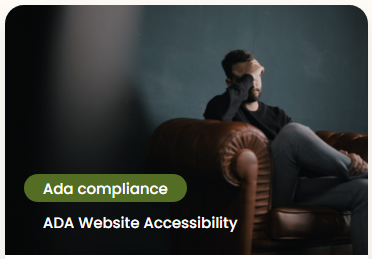The Department of Justice mandates that public accommodations are accessible to everyone despite their disabilities. To enforce the law, ADA (Americans with Disability Act) came into action. Under the Title III of ADA, practising digital accessibility in finance and banking is crucial for businesses that have digital platforms.
When a commercial entity that serves the public fails to provide barrier-free access to the disabled users, it violates the law. Therefore regulatory compliance makes it essential for banks and credit unions to practice Education Accessibility. ADA and Section 508 are two pillars to attain your accessibility objectives. In this post, we will discuss the significance and business benefits of adhering to these two regulations for the players in the finance and banking sector.
What is the ADA and why is it crucial for the finance and banking sector?
As mentioned earlier, ADA is a civil rights law that protects the accessibility rights of the disabled population. When a user is leveraging the digital platform of a bank or financial institution, they expect barrier free access to login,pay the bills andaccess information about the latest products and offers.
Any type of disability that refrains the user from accessing your products and services may result in loss of business. Your loyal customers could switch to another brand or in frustration may file a lawsuit.
Legal repercussions are harmful to the business and the brand image. When more and more users are inclined toward using digital platforms, aiming for ADA compliance banking is a proactive approach.
To practice regulatory compliance, one needs to understand the ADA compliance checklist for digital accessibility. A standard framework is provided by the World Wide Web Consortium (W3C). The regulations are published at different levels of Web Content Accessibility Guidelines (WCAG). Commercial entities are expected to follow the roadmap of A, AA and AAA Levels of WCAG guidelines which are updated frequently to meet the technology advancements. WCAG 2.2 is the latest version that finance and banking entities can follow to approach digital accessibility.
How does Section 508 compliance impact the success of finance and banking?
Section 508 requires that any federal agency that uses or maintains Information and Communication Technology (ICT) products is accessible to everyone.Though it only prohibits federal programs, when you look at the bigger picture all banking and finance sector agencies are regulated by the government. Therefore, it is important for government chartered credit unions to meet Section 508 regulations.
How to attain Section 508 and ADA compliance in finance?
The compliance checklist for digital accessibility in finance and banking includes WCAG guidelines and VPAT (Voluntary Product Accessibility Template). These frameworks enable you to practice accountability and create an accessible product for the users.
The desired level of WCAG compliance can be attained with the help of automated software scans and manual audits.It is a tedious process to verify every element of the website and fill up the VPAT. Additionally, checking every component of the website or mobile app to make it accessible for users with a disability is time consuming. Therefore, most businesses prefer the fast and easier process of automated testing.
Software to test web accessibility resources compliance offers you result with only 30% accuracy. Whereas none of the codes can interpret the frustration of a disabled user like an audit specialist. Human interpretation is more reliable to check the website components for people with cognitive, visual and auditory disabilities.
Bottom line
Practising digital accessibility checker in banking and finance is crucial to reducing the risk of lawsuits. It is also crucial to enhance customer loyalty. To stay ahead of the competition, visit the link given below and have a word with accessibility audit specialists.





Comments